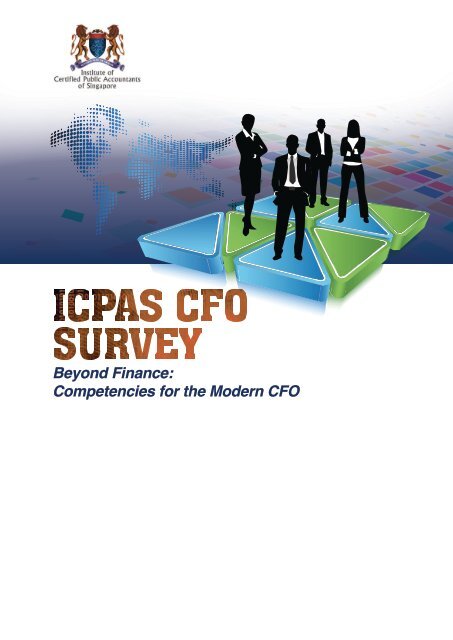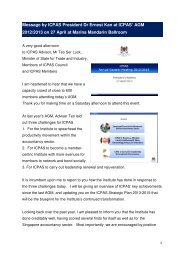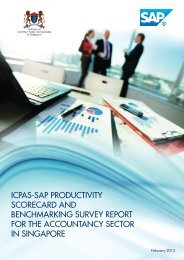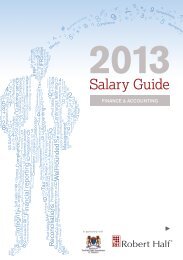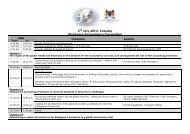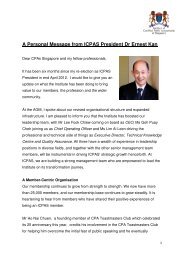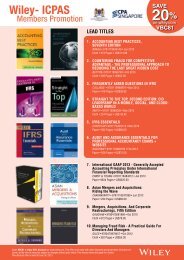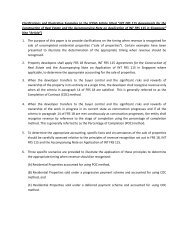ICPAS - CFO Survey 2012 Whitepaper pdf pdf.pdf - CFO innovation ...
ICPAS - CFO Survey 2012 Whitepaper pdf pdf.pdf - CFO innovation ...
ICPAS - CFO Survey 2012 Whitepaper pdf pdf.pdf - CFO innovation ...
Create successful ePaper yourself
Turn your PDF publications into a flip-book with our unique Google optimized e-Paper software.
FOREWORD BY <strong>ICPAS</strong> 1FOREWORDBY <strong>ICPAS</strong>The roles of our finance professionals in business have been transformed significantly over the past decadeas Singapore moves up the economic ladder, with increased standards of corporate governance and morecompanies engaged in cross-border activities. With over 25,000 members, <strong>ICPAS</strong> is committed to equip ourfinance professional members with the knowledge and resources to effectively perform and better meet thedemands of their enhanced roles.Of particular note, the Institute is proud to have more than 6,200 senior finance professionals among itsmembership. With their financial expertise and experience, many of them have helped to contribute to thefinancial transformation of their companies. The Institute is committed to continue supporting this group ofprofessionals to play an integral role in leading Singapore firms to greater heights amidst the global economicchallenges today. This will be in line with the Committee to Develop the Accountancy Sector’s (CDAS) vision totransform Singapore into a global accountancy hub, supported by a vibrant pool of finance professionals withvalue-adding expertise 1 .To better understand the needs of <strong>CFO</strong>s and senior finance professionals, <strong>ICPAS</strong> Research has conductedan <strong>ICPAS</strong> <strong>CFO</strong> <strong>Survey</strong> to assist the Institute in serving this group of members. The findings of the survey,which received strong response from the <strong>CFO</strong> community, will help provide important insights about keycompetencies required of a modern <strong>CFO</strong>.<strong>ICPAS</strong> also recognises the need for the professional development of <strong>CFO</strong>s and aspiring <strong>CFO</strong>s and has rolledout a number of initiatives and programmes such as thought-leadership events, information resources,continuing professional education and networking opportunities. For example, thought-leadership eventssuch as the <strong>ICPAS</strong> <strong>CFO</strong> Seminar “Unlocking Trapped Liquidity in Uncertain Times” was well-received by the<strong>CFO</strong> community. As another example, <strong>ICPAS</strong> CPE also rolled out the CUNY <strong>CFO</strong> Programme in conjunctionwith the City University of New York (CUNY) to help our members further develop themselves as <strong>CFO</strong>s.The Institute is thankful to the <strong>ICPAS</strong> <strong>CFO</strong> Committee for their guidance and insights on the <strong>CFO</strong> survey. Theiradvice will continue to be valuable as the Institute rolls out targeted programmes to meet our members’ needs.We hope the <strong>CFO</strong> report will be of use to help members who are <strong>CFO</strong>s and aspiring <strong>CFO</strong>s to grow theircompetencies, as well as help them to develop their careers as successful financial leaders.Lee Fook ChiewCEOInstitute of Certified Public Accountants of Singapore1Committee to Develop the Accountancy Sector, “Transforming Singapore into a Leading Global Accountancy Hub for Asia-Pacific”, April 12, 2010, p. 38.
0% 10% 20% 30% 40% 50% 60% 70% 80% 90% 100% <strong>CFO</strong> Aspirants and equivalent 171 (54%)4SECTION 1: RESPONDENTS’ PROFILE0 20 40 60 80 100 120 140 160 180 200“The role of the <strong>CFO</strong> has changed dramatically over the last few years. Besides costcontrols and risk management, <strong>CFO</strong>s are now charged equally with possessinga strategic vision for a business and keen commercial insight. The informationFigureand perspectives2: Company’s Turnovergathered from this survey will definitely further the dialogue andunderstanding 60%of this role, and serve <strong>ICPAS</strong> members that are finance professionalsin 50% business better.” - Neo Soon Hup, Chief Financial Officer and Head of BusinessDevelopment, 40% Pan Pacific Hotels Group Limited30%1.3 Industry Representation 56%1.4 Work Experience20%There is a good mix of responses from <strong>CFO</strong>s and Aspirants The 32% majority of respondents (88 percent of <strong>CFO</strong>s and10%across industry sectors. Companies under the education 65 percent of the Aspirants) indicated 12% having work0%sector or companies operating in multiple industries are experience of at least 15 years or more. Among theSmall CompaniesMedium-sized CompaniesLarge Companiesclassified under “Others”.respondents, the average <strong>CFO</strong> would have about 20 to(Annual turnover less than S$100mn) (Annual turnover S$100mn to less (Annual turnover S$1bn and more)than 25 S$1bn) years of experience while the average Aspirant hasslightly less experience of 15 to 20 years.Figure 3: Industry RepresentationFigure 3: Industry RepresentationFigure 13: Corporate Governance Knowledge (CG) for <strong>CFO</strong>s 0% 5% 10% 15% 20% 25%4.20 Energy and natural resources4.10 ManufacturingProfessional services4.00 Construction and real estate3.90 Wholesale & retail trade3.80 Entertainment, media and publishingFinancial services3.70 Healthcare, pharmaceuticals and biotechnologyPublic Private Information & communicationsTransportation, travel and tourismOthers4%5%6%7%8%11%12%8%12%7%20%Communcia:ons with Board (Key Performance Objec:ve) CG Skills CG Training Figure 4: Work Experience Figure 4: Work Experience> 25 years 20 to 25 years 15 to 20 years 10 to 15 years < 10 years 1% 7% 11% 13% 26% 31% 23% 31% 29% 28% <strong>CFO</strong> Aspirants 0% 5% 10% 15% 20% 25% 30% 35% Figure 5: Key Performance Objective of <strong>CFO</strong>s
Figure 13: Corporate Governance Knowledge (CG) for <strong>CFO</strong>s 4.20 4.10 4.00 KEY 3.90 PERFORMANCEOBJECTIVES3.80 CG Training 3.70 Public Private “The <strong>CFO</strong> is a steward of effective governance and ethical practices.” - Ong Wei Wei,Group Financial Controller, OKP Holdings Limited and Singapore Corporate AwardsBest <strong>CFO</strong> of the Year <strong>2012</strong>2.1 <strong>CFO</strong> – The Financial StewardFigure <strong>CFO</strong>s are 4: commonly Work Experience expected to be the financial stewardwithin the organisation. Singapore has one of the mostand shareholders have high expectations regarding <strong>CFO</strong>sperforming the role of financial steward.stringent corporate governance rules, and ranks high incorporate > 25 years governance in Asia 2 . <strong>CFO</strong>s are expected to These results are 26% in line with public expectations and13% play a key role in ensuring that companies comply with corporate governance principles, especially since20 to 25 years 31% regulations, adhere to financial reporting standards and Principle 1123% of the revised Singapore Code of Corporatemaintain 15 to 20 effective years controls relating to finance.Governance (“Code”) now 31% requires <strong>CFO</strong>s <strong>CFO</strong> to provide29% 11% assurance to the Board regarding the effectiveness of10 to 15 years Aspirants Unsurprisingly, <strong>CFO</strong> respondents indicated ethics risk management and 28% internal controls. The SGX Listing1% and integrity < 10 years (89 percent), compliance 7% and control (81 Manual – Rule 610(6) also requires the audit committee,percent), and financial reporting (76 percent) as very of a company’s board, to assess and provide a negativeimportant or critical 0% key performance 5% objectives 10% expected 15% 20% confirmation 25% on the competency, 30% 35% character and integrityof them. These findings suggest that the company boardSECTION 2: KEY PERFORMANCE OBJECTIVESCommuncia:ons with Board (Key Performance Objec:ve) CG Skills of the <strong>CFO</strong> in the initial listing stage.5Figure 5: Key Performance Objective of <strong>CFO</strong>sFigure 5: Key Performance Objective of <strong>CFO</strong>s Support to CEO Ethics and integrity Financial management Compliance and control Financial repor:ng Financial performance Communica:on with Board Strategic management Capital/funding management Business sustainability People management Corporate finance Opera:ons Change management Project management 0% 10% 20% 30% 40% 50% 60% 70% 80% 90% 100% 40% 42% 58% 50% 42% 48% 40% 48% 41% 43% 51% 48% 42% 47% 50% 47% 29% 31% 34% 28% 35% 27% 29% 22% 15% 12% 8% 31% 6% 4% Not important Slightly important Moderately important Very important Cri:cal 2Asian Corporate Governance Association, “CG Watch <strong>2012</strong>”, 19 September <strong>2012</strong>.
<strong>CFO</strong> -‐ Work Responsibility SECTION 3: WORK RESPONSIBILITIES OF <strong>CFO</strong>s9“As <strong>CFO</strong>s spend more time on strategic and governance matters, it is important forsenior finance staff to effectively support the <strong>CFO</strong> in the day to day managementof the finance function.” – Vincent Lim, Regional Financial Controller, MotorolaSolutions3.2 Key Responsibility of <strong>CFO</strong> Aspirants –Financial ReportingIn light of the changing regulatory environment, manyfinancial leaders, especially <strong>CFO</strong>s, face greater difficultiesand challenges in their reporting responsibilities. Yetthe modern <strong>CFO</strong> has to focus more of his attention onstrategic business planning and risk management. Theyare likely to rely more on their next layer, for examplefinancial controllers, to oversee and be responsible forfinancial reporting matters.According to the survey, 86 percent of <strong>CFO</strong> aspirants,which includes financial controllers and finance managers,indicated that they spent moderate or most of their time onfinancial reporting duties. It also shows that <strong>CFO</strong>s spentsignificantly less time, statistically 6 , on financial reportingmatters compared to <strong>CFO</strong> aspirants (see Table 2).Hence it is not unexpected that Aspirants and otherfinance staff have financial reporting, in addition tofinancial planning, as a substantial bulk of their workresponsibilities. As such, substantial competencyand training in financial reporting and also planning isimportant for them (see Figure 9).Table 2: Time Spent by <strong>CFO</strong>s and <strong>CFO</strong> AspirantsTime spent on financial reporting<strong>CFO</strong>s (n=144) 3.86*<strong>CFO</strong> aspirants (n=171) 4.20Average ScoreLegend1-No time required 2-Least amount of time 3-Little time4-Moderate amount of time 5-Most amount of timeRespondents were asked to rate from 1 (No time required) to 5(Most amount of time). The average score is calculated basedon the total accumulated score per attribute divided by the totalnumber of respondents.Figure 9: Time Spent by by <strong>CFO</strong> Aspirants 0% 10% 20% 30% 40% 50% 60% 70% 80% 90% 100% Financial repor:ng Financial planning Working capital management Risk management Strategic business planning Corporate finance Investments Investor rela:ons 47% 60% 50% 50% 40% 47% 39% 28% 25% 22% 27% 18% 30% 6% 21% 5% No :me required Least amount of :me Lible :me Moderate amount of :me Most amount of :me Figure 10: Importance of Work Responsibilities – Working Capital Management 6Significantly different at p
SECTION 4: <strong>CFO</strong> COMPETENCIES11<strong>CFO</strong>COMPETENCIES“The effective <strong>CFO</strong> must be an effective leader and communicator.” – Peter Lee, ChiefFinancial Officer, OSIM and Singapore Corporate Awards Best <strong>CFO</strong> of the Year 20104.1 Importance of C-Suite SkillsThe modern <strong>CFO</strong> is more than just the financial expertamongst the senior management team. Beyond theirtraditional financial stewardship role, <strong>CFO</strong>s are evolvingto be a key strategic business partner to CEOs. They needcomplement their CEOs in decision-making and strategicplanning, leveraging on their financial and technicalexpertise. This requires <strong>CFO</strong>s to be strategic thinkers andgood communicators.Our survey data shows that <strong>CFO</strong>s rate C-Suite genericskills, rather than technical skills, as more important.Above 82 percent of <strong>CFO</strong> respondents indicated suchskills are very important or critical to their roles as <strong>CFO</strong>s(see Table 3 and Appendix).In comparison, technical skills such as financial reportingand accounting & finance are rated as very important orcritical skills by only 66 percent and 62 percent of the<strong>CFO</strong> respondents respectively.Our data also indicate that <strong>CFO</strong> respondents tend to ranktechnical skills significantly less important, statistically 7 ,than Aspirants.Table 3: <strong>CFO</strong> CompetenciesNo. <strong>CFO</strong> Average score <strong>CFO</strong> Aspirants Average score1 Analytical 4.33 Decision making 4.362 Decision making 4.32 Communication 4.333 Communication 4.25 Analytical 4.234 Leadership 4.19 Leadership 4.195 Strategic business planning 4.19 Strategic business planning 4.166 Corporate governance knowledge 4.01 Financial reporting 4.077 Risk management 3.95 Corporate governance knowledge 4.018 Negotiation 3.92 Negotiation 3.999 Regulatory knowledge 3.86 Regulatory knowledge 3.9810 Financial reporting 3.81 Accounting & finance 3.9611 Accounting & finance 3.74 Risk management 3.9112 Industry domain knowledge 3.69 Industry domain knowledge 3.8913 Managing board process 3.68 Administrative 3.7014 Administrative 3.67 Managing board process 3.6515 Treasury 3.52 Treasury 3.5616 Financial modelling 3.49 Financial modelling 3.5117 Capital investment 3.35 Capital investment 3.4518 Investor relations 3.28 Investor relations 3.35Legend1-Not important 2-Slightly important 3-Moderately important 4-Very important 5-CriticalRespondents were asked to rate from 1 (Not important) to 5 (Critical). The average score is calculated based on the total accumulated scoreper attribute divided by the total number of respondents.7Significant difference at p
12 SECTION 4: <strong>CFO</strong> COMPETENCIES“Resources of value are those that help <strong>CFO</strong>s advance their thinking andcompetencies.” - Goh Geok Cheng, Chief Financial Officer, Prudential AssuranceCompany Singapore Pte Ltd4.2 Training resources in Leadership andStrategic Business Skills highly ValuedTo succeed in today’s shorter business cycleenvironment, the modern <strong>CFO</strong> needs to develop multiplecompetencies. The survey shows that <strong>CFO</strong> respondentstend to rate training resources in C-Suite generic skills asrelatively more important than other skills (see Table 4 andAppendix).The data also shows that over 72 percent of <strong>CFO</strong>respondents would like to have access to trainingresources in Leadership and Business Skills (see Figure12). In addition, over 54 percent of them would also like tohave access to technical related training resources.We note that such preferences are congruent with findingsin the previous section (Section 4.1), which indicateC-Suite generic skills are more important than technicalskills to <strong>CFO</strong>s. Hence, training or education programmescatering to such management or leadership needs shouldfind demand.Table 4: Top 10 Important Areas for AdditionalTrainingNo.SkillsAveragescore1 Strategic business planning 4.142 Decision making 3.923 Leadership 3.904 Analytical 3.855 Corporate governanceknowledge3.836 Negotiation 3.837 Communication 3.828 Risk management 3.809 Regulatory knowledge 3.6810 Industry domain knowledge 3.61Legend1-Not important 2-Slightly important 3-Moderately important4-Very important 5-CriticalRespondents were asked to rate from 1 (Not important) to 5(Critical). The average score is calculated based on the totalaccumulated score per attribute divided by the total number ofrespondents.
SECTION 4: <strong>CFO</strong> COMPETENCIES13Figure 12: <strong>CFO</strong> ResourcesFigure 12: <strong>CFO</strong> Resources 0% 10% 20% 30% 40% 50% 60% 70% 80% 90% 100% Business skills resources Leadership skills resources 53% 56% 19% 16% Industry specific resources Regulatory resources Finance / accounEng & technical resources Training programmes <strong>CFO</strong> senEment indice resources Networking events PublicaEons and whitepapers Cost management benchmarks Financial markets informaEon systems E-‐learning Career/job placement Webinars 47% 54% 45% 51% 42% 43% 38% 40% 38% 38% 33% 28% 13% 9% 9% 6% 11% 10% 8% 8% 7% 6% 12% 6% Strongly disagree Disagree Neutral Agree Strongly agree Figure 14: Top 12 <strong>CFO</strong> Competencies 0% 10% 20% 30% 40% 50% 60% 70% 80% 90% 100% AnalyEcal Decision making CommunicaEon Leadership Strategic business planning Corporate governance knowledge Risk management NegoEaEon Regulatory knowledge Financial reporEng AccounEng & finance Industry domain knowledge 53% 52% 56% 49% 48% 58% 55% 50% 47% 44% 47% 49% 40% 40% 35% 37% 36% 24% 22% 23% 22% 22% 15% 13%
14 SECTION 4: <strong>CFO</strong> COMPETENCIES“Before becoming a <strong>CFO</strong>, strong technical skills is a pre-requisite.”– Vincent Lim, Regional Financial Controller, Motorola Solutions4.3 Important Technical Competencies for<strong>CFO</strong>s and AspirantsRisk management is an area of increasing concern for<strong>CFO</strong>s, following the introduction of Principle 11 in therevised Code. This requires both CEOs and <strong>CFO</strong>s toprovide assurance to the company board, regarding theeffectiveness of internal controls and risk management.From the survey findings, <strong>CFO</strong>s tend to rank riskmanagement skills and having more regulatory knowledgeas relatively more important among the technical skill sets(see Table 5 and Appendix). Additionally, about 66 percentof <strong>CFO</strong> respondents indicated that it is very importantor critical to further develop their risk managementcompetencies.On the other hand, over 80 percent of <strong>CFO</strong> respondentsdeemed it important or critical for Aspirants to receivemore training in technical skills, such as financial reportingand accounting & finance, relative to other soft skills. Thisis consistent with our findings that Aspirants tend to spendmore time than <strong>CFO</strong>s on financial reporting matters. Theexpectations and views of <strong>CFO</strong>s, that Aspirants shouldfurther develop their skills in such areas reflect a likelyneed for Aspirants to take on more financial reportingresponsibilities. This should enable <strong>CFO</strong>s to focus moretime and attention on key strategic matters.Table 5: Importance of acquiring further training 8<strong>CFO</strong>sAverage score<strong>CFO</strong> Aspirants(From the <strong>CFO</strong>s’ Perspective)Average scoreStrategic business planning 4.14 Financial reporting 4.26Decision making 3.92 Accounting & finance 4.15Leadership 3.90 Regulatory knowledge 3.96Analytical 3.85 Analytical 3.91Corporate governance knowledge 3.83 Communication 3.89Negotiation 3.83 Leadership 3.78Communication 3.82 Decision making 3.65Risk management 3.80 Administrative 3.65Regulatory knowledge 3.68 Risk management 3.59Industry domain knowledge 3.61 Financial modelling 3.58Managing board process 3.50 Corporate governance knowledge 3.57Capital investment 3.44 Treasury 3.49Treasury 3.42 Industry domain knowledge 3.43Financial modelling 3.27 Strategic business planning 3.40Financial reporting 3.25 Negotiation 3.35Administrative 3.19 Capital investment 3.18Investor relations 3.19 Managing board process 2.87Accounting & finance 3.17 Investor relations 2.79Legend1-Not important 2-Slightly important 3-Moderately important 4-Very important 5-CriticalRespondents were asked to rate from 1 (Not important) to 5 (Critical). The average score is calculated based on the total accumulated scoreper attribute divided by the total number of respondents.8From the perspective of the <strong>CFO</strong>s
Figure 17: Aspirants - Top 10 Important Areas for Additional Training (From the <strong>CFO</strong>s’ perspective)0% 10% 20% 30% 40% 50% 60% 70% 80% 90% 100%Financial reportingAnalytical15SECTION 51% 4: <strong>CFO</strong> COMPETENCIES 35%56%28%Accounting & finance49%31%“Growing uncertainty and complexity in the business environment must mean that<strong>CFO</strong>s become Regulatory effective knowledge risk managers.” – Chow Kam Wing, Executive 55% Director and 22%Chief Financial Officer,CommunicationMicro-Mechanics (Holdings) Ltd & Singapore Corporate49%Awards Best <strong>CFO</strong> of the Year 200822%Leadership48%22%4.4 Corporate Governance, Risk ManagementResponsibilities Financial and Skills modelling48%19%In general, <strong>CFO</strong> respondents regard skills in corporateDecision makinggovernance and risk management as of relatively highCorporate governance knowledgeimportance. A majority of them indicated corporategovernance knowledge (82 percent) and risk managementRisk management(77 percent) as very important or critical skills. FurtherThese findings are in line with the trend of growingstakeholders’ expectations for listed companies to adoptbetter corporate governance and risk managementpractices 9 . The introduction of Principle 11 regardingrisk management and the SGX Listing Rule 1207, whichanalysis suggests that <strong>CFO</strong>s of public-listed companies requires the company board to provide an opinion on thetend to take skills in corporate Not important governance Slightly as important relatively adequacy Moderately of the important company’s internal Very important controls to Critical addressmore serious or important than <strong>CFO</strong>s of private companies finance, operating and compliance risks, are examples of(see Figure 13).growing stakeholder expectations.49%41%38%13%16%15%Figure 13: Corporate Governance Knowledge (CG) for <strong>CFO</strong>sFigure 13: Corporate Governance Knowledge (CG) for <strong>CFO</strong>s4.204.104.003.903.803.70PublicPrivateCommunciations with Board(Key Performance Objective)CG SkillsCG TrainingLegend1-Not important 2-Slightly important 3-Moderately important 4-Very important 5-CriticalRespondents were asked to rate from 1 (Not important) to 5 (Critical). The average score is calculated based on the total accumulated scoreper attribute divided by the total number of respondents.9Padma Venkat, P, “Taking risk management by the horns”, The Business Times, August 14, <strong>2012</strong>.
16CONCLUSIONCONCLUSIONThe evolution of the role of the <strong>CFO</strong>, coupled with theincreased economic uncertainty and higher corporategovernance standards, has placed <strong>CFO</strong>s in the spotlight.Our survey data strongly suggest, if not confirm, thata typical <strong>CFO</strong> now likely has a broader strategic role.The question follows whether the <strong>CFO</strong>s will be able toeffectively step into the bigger shoes of remaining asfinancial stewards as well as becoming key strategicbusiness partners to CEOs. Honestly, can they afford notto?members, especially those professional accountants inbusiness.At present, the institute, working closely alongsidebusinesses and stakeholders, keeps financeprofessionals, particularly our members, abreast of thelatest developments in accountancy and business mattersthrough various channels, such as thought-leadershipevents, information resources, continuous professionaleducation and networking opportunities.<strong>ICPAS</strong> recognises this challenge that <strong>CFO</strong>s and Aspirantsmay face and the need for professional development tokeep pace. Based on the survey findings, the Institutewill roll out more targeted programmes to better meet thisneed. The programmes will focus on the needs not justof the <strong>CFO</strong>s but also the <strong>CFO</strong> aspirants and even thoseless senior finance professionals intending to move upthe career chain. The programmes will also focus on theapplied and practical aspects, so as to better equip themwith the requisite competencies to effectively perform andmanage the demands of their roles, and in the process,contribute to their professional development.In rolling out such targeted programmes, the Institutewill tap on the expertise and advice of the <strong>ICPAS</strong> <strong>CFO</strong>Committee. Established since 2006, the Committeecomprises many distinguished CPAs Singapore, who are<strong>CFO</strong>s or C-Suite executives with significant business,finance and risk management experience. The Committeeprovides invaluable guidance and feedback, with regardto the Institute’s initiatives, in order to better serve ourThe Institute recently rolled out the monthly <strong>ICPAS</strong>Breakfast Talk Series for Accountants in Business to keepour members current in their professional and businessknowledge. Created with the busy executive in mind,pertinent issues such as procurement controls, IPOs,business continuity and business analytics are discussed.These seminars are also an excellent platform for likemindedprofessionals to network. Thought-leadershipevents, such as <strong>ICPAS</strong> <strong>CFO</strong> Seminar “Unlocking TrappedLiquidity in Uncertain Times” delivered by relevantexperts, promote discussion of practical issues and thesharing of best practices or latest thinking amongst thepractitioners. More such seminars are being planned.Overall, the feedback has been positive.I find this seminar very informative as itrelates to our day to day financial operationsand I hope <strong>ICPAS</strong> will continue to organizemore such seminars, if possible, withdifferent banks. – Koh Cher Wee, FinanceManager, Alimak Hek Pte Ltd
CONCLUSION17<strong>ICPAS</strong> Research also produces timely and relevantthought-leadership materials on business and accountingissues, such as best practices in internal controls and this<strong>CFO</strong> <strong>Survey</strong>. Through gaining a deeper understanding ofthe needs of <strong>CFO</strong>s, the institute will be able to better alignour initiatives to cater to members’ needs.Beyond competency training, <strong>CFO</strong>s should also continueto focus on matters of ethics and integrity as importantfinancial stewards. The ability to remain competent notonly in the accounting profession but also in a rapidlychanging and competitive business environment hingesultimately on members’ commitment to continuallyupgrade their professional knowledge and skills.The <strong>ICPAS</strong> online knowledge centres, such as Centre forFinancial Reporting, Centre for Auditing and Assuranceand Ethics Centre, also provide our member <strong>CFO</strong>s andfinance professionals with relevant knowledge updateson topical issues and help them keep up to-date with thechanging landscape.With increasing public expectations and demands on theprofession, continuing professional education (CPE) forthe accounting and finance professionals is a necessity,more so for the modern <strong>CFO</strong>. The Institute’s CPE <strong>CFO</strong>Series put together select and relevant course modules,such as ethics, accounting, finance, and taxation. Thesecourses aid <strong>CFO</strong>s and Aspirants to become moreproficient finance leaders.For example, as a specific initiative to help our membersfurther develop themselves as <strong>CFO</strong>s, the Institute hasrolled out, together with the City University of NewYork (CUNY) which is reputed for its applied financeprogrammes, the CUNY <strong>CFO</strong> Certification Programme.The first course, which attracted good participation, willrun in early November <strong>2012</strong>. The trainers, Professors DanLevin and John A. Griffith, have significant years of Boardand <strong>CFO</strong> experience. Participating <strong>CFO</strong>s can benefit fromtheir expert insights to gain relevant skills and knowledgeto manage challenges that <strong>CFO</strong>s may encounter.
4 Financial markets informaEon systems 38% 7% E-‐learning 38% 6% 18APPENDIXCareer/job placement Webinars 33% 28% 12% 6% APPENDIXFigure 14: Top 12 <strong>CFO</strong> Competencies Figure 14: Top 12 <strong>CFO</strong> CompetenciesStrongly disagree Disagree Neutral Agree Strongly agree 0% 10% 20% 30% 40% 50% 60% 70% 80% 90% 100% AnalyEcal Decision making CommunicaEon Leadership Strategic business planning Corporate governance knowledge Risk management NegoEaEon Regulatory knowledge Financial reporEng AccounEng & finance Industry domain knowledge 53% 52% 56% 49% 48% 58% 55% 50% 47% 44% 47% 49% 40% 40% 35% 37% 36% 24% 22% 23% 22% 22% 15% 13% Not important Slightly important Moderately important Very important CriEcal Figure 15: Top 12 Aspirant Competencies Figure 15: Top 12 Aspirant Competencies0% 10% 20% 30% 40% 50% 60% 70% 80% 90% 100% Decision making Communica:on Analy:cal Leadership Strategic business planning Financial repor:ng Corporate governance knowledge Nego:a:on Regulatory knowledge Accoun:ng & finance Risk management Industry domain knowledge 50% 51% 60% 56% 49% 54% 50% 54% 46% 48% 47% 50% 44% 41% 32% 33% 35% 28% 27% 25% 26% 26% 23% 21% Not important Slightly important Moderately important Very important Cri:cal Figure 6: Working Capital/Funding Management Key Performance Objectives of <strong>CFO</strong>s
Risk management Industry domain knowledge 47% 50% 23% 21% Not important Slightly important Moderately important Very important CriEcal APPENDIX19 Figure 16: <strong>CFO</strong>s -‐ Top 10 Important Areas for Additional Training Figure 16: <strong>CFO</strong>s - Top 10 Important Areas for Additional Training0% 10% 20% 30% 40% 50% 60% 70% 80% 90% 100% Strategic business planning 38% 40% Decision making Leadership AnalyEcal Corporate governance knowledge NegoEaEon CommunicaEon Risk management Regulatory knowledge Industry domain knowledge 47% 42% 41% 47% 43% 40% 46% 47% 40% 24% 26% 24% 21% 24% 24% 20% 14% 15% Not important Slightly important Moderately important Very important CriEcal Figure 17: Aspirants - Top 10 Important Areas for Additional Training (From the <strong>CFO</strong>s’ perspective)Figure 17: Aspirants - Top 10 Important Areas for Additional Training (From the <strong>CFO</strong>s’ perspective)0% 10% 20% 30% 40% 50% 60% 70% 80% 90% 100%Financial reportingAnalyticalAccounting & finance51%56%49%35%28%31%Regulatory knowledgeCommunicationLeadershipFinancial modellingDecision makingCorporate governance knowledgeRisk management55%49%48%48%49%41%38%22%22%22%19%13%16%15%Not important Slightly important Moderately important Very important CriticalFigure 13: Corporate Governance Knowledge (CG) for <strong>CFO</strong>s4.20
20 ACKNOWLEDGEMENTSACKNOWLEDGEMENTSProduced by:<strong>ICPAS</strong> Research TeamMr. Chan Sze Yee – Head, ResearchMr. Germin Ong – Manager, ResearchMs. Perrine Oh – Manager, ResearchMr. James Shen – Executive, ResearchMs. Kay Zin – Executive Assistant, ResearchThe <strong>ICPAS</strong> Research team sincerely thank the <strong>ICPAS</strong> <strong>CFO</strong> Committee and Mr. Yee Cheok Hong,Executive Director (Policy & Strategic Planning / Industry Development), for their invaluable feedbackand guidance with regard to this <strong>CFO</strong> study.
ABOUT <strong>ICPAS</strong> RESEARCH21ABOUT <strong>ICPAS</strong>RESEARCH<strong>ICPAS</strong> Research identifies, explores and analyses the major issues driving today’s business dynamics and shapingtomorrow’s marketplace. We aim to closely monitor the accounting and auditing industry in order to provide an outlookfor tomorrow.<strong>ICPAS</strong> Research is committed to participating in and supporting high quality research which is focused, timely, relevantand useful to the accountancy profession. We support the conduct of research with a global or local perspective.<strong>ICPAS</strong> Research focuses our attention on continuously connecting with our practice members. Practitioners havenumerous concerns and issues on their day-to-day practice. These may range from technical understanding to practicalapplications or even operational issues. A part of our research is directed at engaging our members to examine thesepractice matters and exploring practical solutions with them. The various ways that <strong>ICPAS</strong> shows its commitment to theresearch arena includes partnering with business partners or interested parties and involvement in thought leadershipactivities. There will also be conferences held to feature and showcase the results of our research with our membersand the public.We will continuously seek comments from <strong>ICPAS</strong> members through surveys to gather views from the CPA Singaporecommunity. Do send your comments to research@icpas.org.sgThis document contains general information only and <strong>ICPAS</strong> is not, by means of this document, rendering anyprofessional advice or services. This document is not a substitute for such professional advice or services, nor shouldit be used as a basis for any decision or action that may affect your business. Before making any decision or takingany action that may affect your business, you should consult a professional advisor. Whilst every care has been takenin compiling this document, <strong>ICPAS</strong> makes no representations or warranty (expressed or implied) about the accuracy,suitability, reliability or completeness of the information for any purpose. <strong>ICPAS</strong>, its employees or agents accept noliability to any party for any loss, damage or costs howsoever arising, whether directly or indirectly from any action ordecision taken (or not taken) as a result of any person relying on or otherwise using this document or arising from anyomission from it.INSTITUTE OF CERTIFIED PUBLIC ACCOUNTANTS OF SINGAPORE20 Aljunied Road #06-02CPA House Singapore 389805Tel: (65) 6749 8060Fax: (65) 6749 8061Email: cpasingapore@icpas.org.sgwww.icpas.org.sg
INSTITUTE OF CERTIFIED PUBLIC ACCOUNTANTS OF SINGAPORE20 Aljunied Road #06-02CPA House Singapore 389805Tel: (65) 6749 8060Fax: (65) 6749 8061Email: cpasingapore@icpas.org.sgwww.icpas.org.sg


